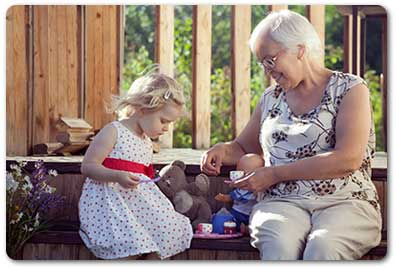With Grandparent’s Day this Sunday, 4 October 2020, we thought it was the perfect time to discuss grandparent’s rights to contact with their grandchildren.
 Whilst it is usually parents who are responsible for caring for their children on a daily basis and ensuring that all of their needs are met, grandparents frequently also play an incredibly important role in the lives of their grandchildren.
Whilst it is usually parents who are responsible for caring for their children on a daily basis and ensuring that all of their needs are met, grandparents frequently also play an incredibly important role in the lives of their grandchildren.
With nursery and after-school care being so expensive, combined with parents often wanting their children to be looked after by someone they know, it often falls on grandparents to look after their grandchildren on what can be a daily basis.
In fact, the Scottish Government has said that as many as two-thirds of parents now rely on grandparents for their childcare. Clearly, the care and assistance that grandparents provide their grandchildren is invaluable and cannot be underestimated.
However, grandparents can sometimes find themselves in the upsetting situation where they are either no longer seeing their grandchildren, or, have never been allowed to see their grandchildren in the first place.
There can be a variety of reasons as to why contact between grandparent and grandchild is not taking place including:
- The Separation of a child’s parents.
- A family falling out.
- Relocation of a family/child.
- Changes in the family set up due to ill health or bereavement.
So, if you are a grandparent, and you are not allowed to have contact with your grandchild, what rights do you have?
It may come as a shock to many to read that grandparents of a child living in Scotland do not have any automatic, legal right to contact with their grandchild. However, they do have the ability, just as a parent who is being denied contact would, to ask the court to grant an order allowing contact, of which more below.
So, what can a grandparent do if they want to have contact with their grandchildren, and they are not being allowed to have any?
-
Contact a specialist, family law solicitor
They will be able to provide a grandparent with all the important information that they need to know by obtaining all of the facts relevant to the case. They will likely contact the child’s parents on the grandparent’s behalf in order to try and reach an agreement regarding contact arrangements. Hopefully, with a solicitor’s help, a grandparent will be able to put contact arrangements in place to ensure that they see their grandchildren regularly.
-
Mediation
If negotiation does not work, and there are difficulties with parents and grandparents communicating, then it may be that mediation is the next best option. Mediation can be incredibly helpful as it will bring everyone involved together for face to face discussions. (Albeit, these discussions may be via video-conference given the current pandemic.)
Ultimately, these meetings would be to discuss the issues at hand and to try and reach a resolution for contact that everyone is happy with. Mediations are run by mediators who are impartial and specially trained in order to assist with such situations. We have trained mediators here at BTO who would be happy to mediate such meetings.
-
Collaboration
If mediation fails, or a party does not wish to take part (mediation is a voluntary process) then it may be that the Collaborative process could be utilised in order to try and resolve the problem.
Collaboration is an alternative method of dispute resolution in Scotland. It is fairly new but is starting to grow and we have a number of solicitors trained in collaboration here at BTO.
In collaboration, all discussions take place in the form of meetings attended by all parties and their solicitors – and very often facilitated by family consultants from a therapeutic background. (Again this is likely to take place via video-conference at the present time.)
There is an added incentive to reach agreement using collaboration because if discussions breakdown and a court action needs to be raised, then the solicitors who are acting for the parties in the collaborative process can no longer act.
-
Court
If there is still no agreement regarding contact between grandparent and grandchild, then it is possible for grandparents to apply to their local sheriff court for a contact order. This would grant them an order setting out that they are to have regular contact with their grandchild.The raising of a court order should be a last resort, as it is not only expensive and time-consuming, but because of its adversarial nature, can often result in making relationships more fraught and damaged than they were before. However, it may be that a court order is the only option left open to a grandparent wishing to have contact with their grandchild.
If, as grandparent, you are left with no other option but to raise a court action, then you should be aware of the following:
a. The court will only make an order if it considers that it is in the best interests of the child that such an order is made.
b. The court will only make an order if it views that it would be better for the child that the order is made than it is not.
c. Given the Children (Scotland) Bill (which is now in its final stages) it is also likely that the court will take account of the child’s views no matter what age they are – unless of course, they are a baby or young toddler.
d. An order will generally continue until the child is aged 16.
The outcomes of a court action will depend on the facts and circumstances of the case. Sheriffs approach cases before them in different ways, but they will always have the best interests of the child at the forefront of their minds when coming to a decision.
It is therefore important to work with a specialist family solicitor in order to prepare your case properly and have the best chance of ensuring a contact order is granted in your favour. (A residence order can be made to the local sheriff court if a grandparent believes that their grandchild should live with them. That, however, is a topic for another time.)
If you are in the upsetting, and difficult situation where you are not having contact with your grandchild, or not having as much contact as you would like, then please do get in touch with a member of our team in order that we can advise you about the best way forward.





